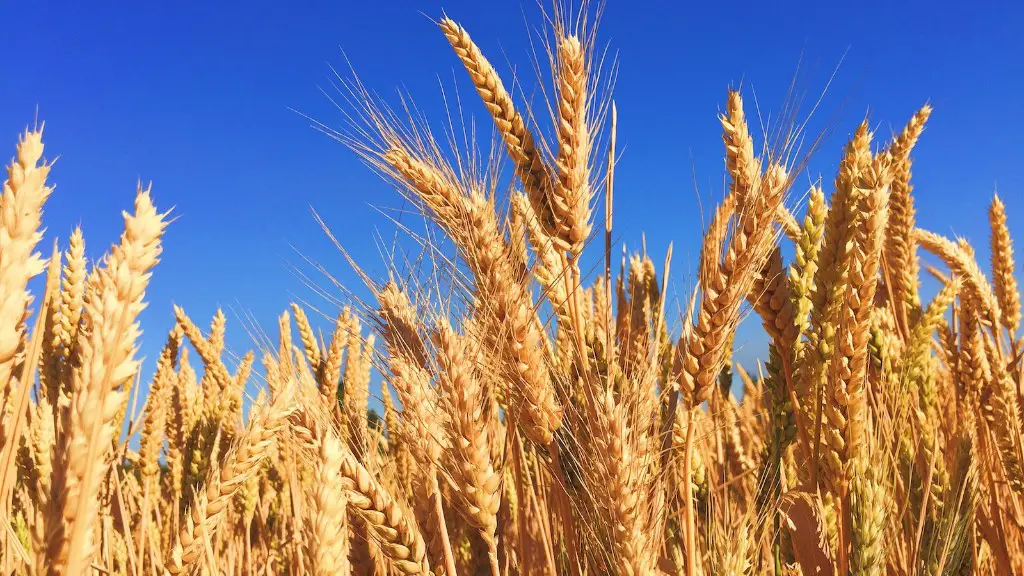Organic Agriculture is a system of farming that utilizes sustainable practices such as crop rotation, composting, and natural pest control for the purpose of producing foods free of synthetic toxins. A key component of this methodology is the use of natural fertilizer sources to promote healthy and abundant crops. Organic farmers must also employ careful soil management practices in order to ensure healthy crops as well as nutrient-rich fertilizer.
Organic farmers typically utilize a variety of natural fertilizers derived from animal and plant-based materials. Manure from livestock such as cows, chicken, horses, and other farm animals are mixed with the soil to help add nutrients and increase its fertility. Animal manure is especially effective because it contains an array of micronutrients that are beneficial for plant growth.
Organic farmers also often turn to plant-based materials such as compost, mulch, and cover crops to enrich their soil. Compost is created when organic matter decomposes, releasing nutrients and beneficial microbes into the soil. Mulch is most commonly used around plants to help conserve soil moisture. It also serves to protect the soil from temperature changes, prevent weeds, and provide nutrients for the plants.
Cover crops are used to replenish the soil with organic matter and to protect it from the elements. They are planted during the off-season when other crops are not growing. As the cover crop decomposes, its remains add vital nutrients to the soil and help to improve its structure. Common cover crops used in organic farming include clover, rye, and vetch.
Organic farmers have a variety of natural fertilizers at their disposal, which can be used to promote healthy and bountiful crops. Livestock manures add important nutrients to the soil, while plant-based materials such as compost, mulch, and cover crops replenish the soil with organic matter and protect it from the elements. Careful soil management practices must also be employed for optimal results.
Organic Fertilizers and Soil Refreshment
Organic farmers use natural materials to keep their soil healthy and well-supplied with important nutrients. Refreshing the soil with organic fertilizer is a key component of organic agriculture. Natural materials such as manure, compost, mulch, and cover crops provide nutrient-rich organic material that breaks down naturally over time to add vital minerals and macro-nutrients to the soil.
The use of these organic materials allows farmers to refresh the soil without over-fertilizing, which can lead to nutrient pollution and other environmental concerns. The decomposition of organic fertilizer into the soil also improves aeration and water infiltration, strengthens soil structure, and helps build carbon up in the soil, all of which contribute to more productive soil.
Organic farmers also use crop rotation and other carefully planned soil practices to further improve and maintain healthy soil. Rotating crops between seasons helps to replenish and restore the soil, while leaving certain areas fallow helps to replenish the minerals and nutrients in the soil. In addition, organic farmers often have access to natural means of controlling pests and diseases, reducing the need for chemical pesticides or fungicides.
Organic crops can also improve the quality of water. By avoiding the use of harsh synthetic fertilizers, organic farmers can help to reduce the levels of nutrients runoff from their fields and prevent nutrient pollution in nearby waterways.
Organic Fertilizers versus Synthetic Fertilizers
Organic fertilizers are derived from natural materials, while synthetic fertilizers are created in a laboratory using chemicals. Organic fertilizers are able to slowly release their nutrients over time, while synthetic fertilizers often release their nutrients too quickly, leading to problems such as burning the plant or leaching of nutrients out of the soil.
Organic fertilizers also offer more benefits than synthetic fertilizers. They contain beneficial microorganisms that help to promote healthy root systems and increase water retention in the soil. In addition, organic fertilizers often contain trace elements such as magnesium, iron, and cobalt that are essential for plant nutrition.
Finally, organic fertilizers are often more economical than synthetic fertilizers. They are also often locally sourced, reducing the strain on the environment caused by long-distance transportation. Organic fertilizers can be used for long-term soil improvement and help to create a more sustainable farming system.
Organic Fertilization and Nutrient Management
Organic fertilizers and amendments are essential components of nutrient management. Organic farmers must carefully consider their fertilizer schedule and the type of fertilizer they use in order to ensure that their soils remain rich in nutrients. An excess of fertilizer can lead to nutrient pollution, while a shortage can result in poor plant growth.
Organic farmers often use the concept of “feeding the soil, not the plants” to maximize their nutrient management. This involves replenishing and restoring soil furniture by adding organic matter to the soil, such as dead plant matter and animal manure. This helps to create a strong and healthy soil that is ready to receive nutrients and support plant growth.
Organic farmers also use mulching and cover crops to help feed the soil with organic matter and protect it from the elements. These types of protective measures can also help to improve water infiltration and reduce the potential for runoff from the field.
In addition, organic farmers must carefully choose their fertilizer sources. They must consider the type and amount of fertilizer needed, as well as the potential for leaching, runoff, and burning plants. Organic fertilizers often contain natural micronutrients and trace elements, which can help to promote better plant growth.
Nutrient Balance and Optimizing Soil Health
Organic farmers must carefully manage their soils in order to ensure optimum fertility and production. Nutrient balance is key to ensuring good soil health, as too little or too much of a certain nutrient can have devastating effects. Nitrogen, Phosphorus, and Potassium are essential nutrients for plant growth, but an imbalance can result in poor plant yields.
Organic farmers must also consider other factors when managing their soil, such as soil pH, organic matter content, and microbial activity. Soil pH is especially important, as plants require a certain pH range to perform correctly. A soil that is too acidic, for example, may be unable to receive and retain nitrogen, resulting in poor plant growth.
Organic matter content, or humus, is also essential to a healthy soil. Organic matter helps to improve soil structure, promote good drainage, and increase soil fertility and nutrient retention. High organic matter content helps to create a living soil that is able to support healthy plant growth.
Finally, microbial activity is essential for a healthy soil. Certain beneficial microbes, such as mycorrhizal fungi, help to unlock nutrients for easy absorption into the plant, while others can help to fight off pests and diseases. Organic farmers must manage their soils to create the conditions necessary for these microbes to thrive.
Organic Fertilizers and Crop Quality
Organic fertilizers offer numerous benefits for crop quality. They help to create a well-structured and nutrient-dense soil that is able to produce high-quality crops. Organic fertilizers also contain trace elements and micronutrients not found in synthetic fertilizers, which can result in better flavor and more nutritious fruits and vegetables.
Organic fertilizers also help to reduce the risks associated with over-fertilizing, since organic matter slowly releases its nutrients over time. This can help to reduce the levels of nutrients runoff from the field, preventing nutrient pollution in nearby water sources. Organic fertilizers also help to conserve soil moisture and reduce the need for irrigation.
Finally, organic fertilizations can help to promote healthier and more productive soils. This includes increasing soil fertility, improving soil structure, and stimulating beneficial microbial activity, leading to better crop yields and higher quality products.
Organic Fertilizers and Crop Yields
Organic fertilizations can be beneficial for crop yields. By providing a nutrient-rich soil, organic fertilizers can help to create happier and healthier plants that are able to produce better yields. Organic fertilizers also help to promote beneficial microbial activity that can help to optimize nutrient uptake and reduce the need for additional inputs, such as irrigation and fertilizer.
Organic fertilizations can also help to reduce the risk of nutrient leaching and runoff, leading to higher yields with fewer inputs. In addition, organic fertilizers offer a more economical alternative to synthetic fertilizers. They are often locally-sourced, reducing the environmental impact of importing fertilizers from other areas.
Organic fertilizations also offer numerous environmental benefits. By avoiding synthetic fertilizers, organic farmers help to improve the water quality of nearby water sources. They also help to reduce the risk of runoff, nutrient leaching, and soil erosion.
To ensure optimal crop yields, organic farmers must also carefully manage their soil. This includes regular soil testing, crop rotation, and the use of mulch and cover crops. These practices help to create a well-structured and nutrient-rich soil that is able to produce better yields with fewer inputs.





